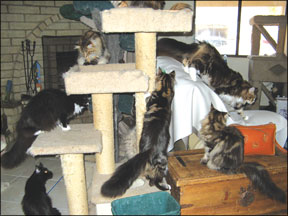Dear Elizabeth: Im at my wits end with my brother and I do hope that you can help! He has well over 100 cats living in his small apartment. The stench there is overwhelming – Ive stopped going over because I cant breathe when Im inside. It all started innocently enough, when he started feeding the strays in the neighborhood and took in a pregnant cat, which soon gave birth to six kittens. Then the neighbors started coming to him with stray kittens they found. He meant to find them all homes of their own, but good homes were hard to find. Now, he has so many cats that he cant afford to have them neutered (which means the population has been growing astronomically). Theyre not receiving any medical care, so some of them are sick, and its all he can do just to feed them each day. The neighbors are trying to have him evicted and I cant say I blame them. I dont know how to help him, but I do know something needs to be done! Despite your brothers best intentions to provide a haven for cats in need, the situation has spiraled out of control and he has become an animal hoarder – a person who collects large numbers of animals while failing to provide minimum standards of nutrition, sanitation and veterinary care. Animal hoarders invariably insist that their animals are loved and well cared for and seem incapable of seeing the filthy conditions their animals are living in. They do not recognize that the animals may be sick or dying from lack of care. Some hoarders claim they run rescue shelters and are protecting animals who would otherwise be euthanized. According to Dr. Gary Patronek, director of the Tufts University Center for Animals and Public Policy and the founder of the Hoarding of Animals Research Consortium, most cases he has studied involved women (76 percent); almost half lived alone; and, in over 80 percent of cases, dead or sick animals were discovered. Yet nearly 60 percent of the hoarders denied there was a problem. Living areas were soiled by urine or feces in 69 percent of cases and in over 25 percent of homes, beds were Bev Caldwell 288 also soiled with animal waste. Weve all heard sensational stories about “the crazy cat lady” harboring hundreds of cats in her home, but animal hoarding is now being recognized as a widespread problem, affecting all sorts of animals in every area of the country. An estimated 250,000 animals per year are victims of hoarding. Recent studies suggest that animal hoarding may stem from a psychological disorder, perhaps related to obsessive-compulsive disorder or dementia, but much remains to be learned about the causes and best treatments for this multi-faceted problem. What is clear is that animals in hoarding situations are living in deplorable conditions and desperately need help. Even after criminal prosecution and incarceration, almost 100 percent of animal hoarders will immediately resume collecting animals unless there is sensitive intervention, including treatment of underlying psychological disorders and continuous follow-up. Im sure you can appreciate how important it is to do your research and to proceed cautiously
What can you do?
(1) Read and learn about animal hoarding. Early recognition by family members, friends or veterinarians and timely intervention may be the single most important steps in preventing massive accumulations of animals and all of the suffering that goes along with animal hoarding.
(2) Contact local humane societies and social service agencies to see what services they offer. For example, the ASPCA in New York City has a mobile clinic, and they will spay or neuter animals right outside the home and assist with medical care. In some cases, there is no place for all of the animals to go (lets face it, not many people are looking to adopt neglected, sick, poorly socialized adult animals). As an alternative to euthanasia, some communities work with hoarders to provide medical care for the animals, neutering services to stem overpopulation, psychological care for the hoarder, and home visits to ensure that animals are properly cared for.
(3) Encourage your brother to seek professional care from a therapist, preferably one experienced with hoarding.
(4) Follow up. Maintain contact with your brother to ensure that his animals receive good care and that he doesnt accumulate additional animals.
My heart goes out to you and the cats involved in this most difficult situation, and I wish you the best of luck in finding a solution where everyone benefits. Love, Elizabeth
- apartment in New York City and Izzy is never outside, so why does she need a rabies vaccine?
The simplest answer is that rabies vaccines are required by law for all cats and dogs over the age of six months in New York state – and many other states have similar requirements. But thats probably not a very satisfying answer. Despite my eaipping rabies vaccinations are just too great!



